|
Now you can read my book of poems (online) for free. Not sure who made it available online, but it’s cool. It’s better to be read for free than not to be read at all. Well, sometimes it is. Certainly, in this instance. (My book has a small print run.)
0 Comments
Natasha Trethewey’s poem “Again, The Fields” responds to Winslow Homer’s post-Civil War painting The Veteran in a New Field.
AGAIN, THE FIELDS AFTER WINSLOW HOMER the dead they lay long the lines like sheaves of Wheat I could have walked on the boddes all most from one end too the other No more muskets, the bone-drag weariness of marching, the trampled grass, soaked earth red as the wine of sacrament. Now, the veteran turns toward a new field, bright as domes of the republic. Here, he has shrugged off the past—his jacket and canteen flung down in the corner. At the center of the painting, he anchors the trinity, joining earth and sky. The wheat falls beneath his scythe-- a language of bounty—the swaths like scripture on the field’s open page. Boundless, the wheat stretches beyond the frame, as if toward a distant field-- the white canvas where sky and cotton meet, where another veteran toils, his hands the color of dark soil. Read Trethewey's poem "South." 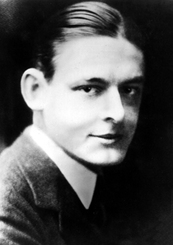 _This Easter I posted, on an alumni discussion group for writers, T.S. Eliot’s lines about the events that preceded and followed the Crucifixion.* An alum wrote me back and claimed that Eliot’s body of work has fallen out of fashion. The alum was right, of course. Eliot’s impersonal style doesn't resonate with readers and poets now the way it once did. Though I'm a huge fan, that aspect of his work doesn't appeal to me much either. When I was learning the craft of poetry, Eliot was, at one point, a major influence (he still is). Even then, I cherry-picked his "bag of tricks," scrutinizing his line breaks, use of meter and musicality and leaving behind his impersonality. I think Eliot would have approved of the way in which I stole from him. As he put it, "Immature poets imitate; mature poets steal; bad poets deface what they take, and good poets make it into something better, or at least something different. The good poet welds his theft into a whole of feeling which is unique, utterly different from that from which it was torn; the bad poet throws it into something which has no cohesion. A good poet will usually borrow from authors remote in time, or alien in language, or diverse in interest. Chapman borrowed from Seneca; Shakespeare and Webster from Montaigne. The two great followers of Shakespeare, Webster and Tourneur, in their mature work do not borrow from him; he is too close to them to be of use to them in this way." To return to Eliot's loss of vogue, he is not alone. What happened to him has happened to many a poet and writer. Those talented and lucky enough to be canonized still suffer the vicissitudes of literary taste. Usually, anyway. But I'm sure interest in Eliot will resurge one of these days. Even if his impersonal style never catches on again, readers and poets will again, in droves, find something in his work worth contemplating. His talent and achievements are too large for it to be otherwise. *Below are the lines in which Eliot describes the events that preceded and followed the Crucifixion. This passage is from The Waste Land: After the torchlight red on sweaty faces After the frosty silence in the gardens After the agony in stony places The shouting and the crying Prison and palace and reverberation Of thunder of spring over distant mountains He who was living is now dead We who were living are now dying With a little patience  Alabanza: In Praise of Local 100 by Martín Espada for the 43 members of Hotel Employees and Restaurant Employees Local 100, working at the Windows on the World restaurant, who lost their lives in the attack on the World Trade Center Alabanza. Praise the cook with the shaven head and a tattoo on his shoulder that said Oye, a blue-eyed Puerto Rican with people from Fajardo, the harbor of pirates centuries ago. Praise the lighthouse in Fajardo, candle glimmering white to worship the dark saint of the sea. Alabanza. Praise the cook's yellow Pirates cap worn in the name of Roberto Clemente, his plane that flamed into the ocean loaded with cans for Nicaragua, for all the mouths chewing the ash of earthquakes. Alabanza. Praise the kitchen radio, dial clicked even before the dial on the oven, so that music and Spanish rose before bread. Praise the bread. Alabanza. Praise Manhattan from a hundred and seven flights up, like Atlantis glimpsed through the windows of an ancient aquarium. Praise the great windows where immigrants from the kitchen could squint and almost see their world, hear the chant of nations: Ecuador, México, Republica Dominicana, Haiti, Yemen, Ghana, Bangladesh. Alabanza. Praise the kitchen in the morning, where the gas burned blue on every stove and exhaust fans fired their diminutive propellers, hands cracked eggs with quick thumbs or sliced open cartons to build an altar of cans. Alabanza. Praise the busboy's music, the chime-chime of his dishes and silverware in the tub. Alabanza. Praise the dish-dog, the dishwasher who worked that morning because another dishwasher could not stop coughing, or because he needed overtime to pile the sacks of rice and beans for a family floating away on some Caribbean island plagued by frogs. Alabanza. Praise the waitress who heard the radio in the kitchen and sang to herself about a man gone. Alabanza. After the thunder wilder than thunder, after the booming ice storm of glass from the great windows, after the radio stopped singing like a tree full of terrified frogs, after night burst the dam of day and flooded the kitchen, for a time the stoves glowed in darkness like the lighthouse in Fajardo, like a cook's soul. Soul I say, even if the dead cannot tell us about the bristles of God's beard because God has no face, soul I say, to name the smoke-beings flung in constellations across the night sky of this city and cities to come. Alabanza I say, even if God has no face. Alabanza. When the war began, from Manhattan to Kabul two constellations of smoke rose and drifted to each other, mingling in icy air, and one said with an Afghan tongue: Teach me to dance. We have no music here. And the other said with a Spanish tongue: I will teach you. Music is all we have.  When Romantic poet John Keats wrote the below sonnet, he captured something virtually every poet and writer has felt at some point, especially during times when life is particularly intrusive and leaves one with little or no time to write. As little writing time as I have these days, I know exactly how Keats felt when he penned these lines: When I have fears that I may cease to be Before my pen has glean’d my teeming brain, Before high piled books, in charact’ry, Hold like rich garners the full-ripen’d grain; When I behold, upon the night’s starr’d face, Huge cloudy symbols of a high romance, And think that I may never live to trace Their shadows, with the magic hand of chance; And when I feel, fair creature of an hour! That I shall never look upon thee more, Never have relish in the faery power Of unreflecting love!—then on the shore Of the wide world I stand alone, and think Till Love and Fame to nothingness do sink.  Recently, I had to read Hamlet to help a student I tutor. It was great reading it again after all these years. It’s my favorite Shakespeare play and one of my favorite literary works of all time. There are so many beautiful passages. Here is just one… But first, let me set it up for you. Hamlet has just been visited by a spirit claiming to be the ghost of his murdered father. Before leaving, the ghost commands Hamlet to remember him. Alone now, Hamlet proclaims: Remember thee! Ay, thou poor ghost, while memory holds a seat In this distracted globe. Remember thee! Yea, from the table of my memory I’ll wipe away all trivial fond records, All saws of books, all forms, all pressures past, That youth and observation copied there; And thy commandment all alone shall live Within the book and volume of my brain, Unmix’d with baser matter. I thought the poem below might get a rise out of my visual-artist friends and anyone else interested in art: 1400 by Albert Goldbarth (born 1948) Saps, and the anal grease of an otter, and pig's blood, and the crushed-up bulbous bodies of those insects that they'd find so thickly gathered on barnyard excrement it makes a pulsing rind, and oven soot, and the oil that forms in a flask of urine and rotting horseflesh, and the white of an egg, and charcoal, and the secret watery substance in an egg, and spit-in-charcoal in a sluggish runnel of gray they mixed with the harvested scum of a bloated tomato, and steamed plant marrows beaten to a paste, and orange clay, and auburn clay, and clay bespangled with the liquid pearl of fish scales stirred in milt, and suet, and glue boiled out of a hoof, and ash, and grape-like clusters of fat grabbed out of a chicken carcass and dried in the sun until it became inert and yet still pliable, and lime, and the pulp of the cherry, and the pulp of the cherry immersed in egg, and coral in a powder, and silver flake, and fig, and pollen, and dust, and beeswax, and an iridescence scraped with infinite care from the wings of hundreds of tiny flying things, and salted iridescence, and human milk, and ores, and gall, and stains expressed from teas, and gobs of squeeze-off from the nettings of cheese, and rouge, and kohl, and luster, and oyster, and lees: and so from these they made their paints: and then their Gods and their saints. 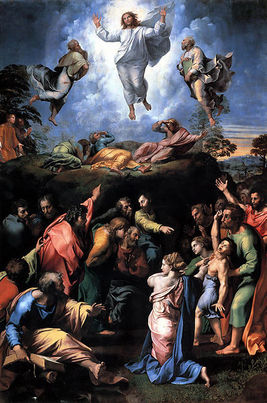 'The Transfiguration' by Raphael One of the striking features of Albert Goldbarth’s poem is that it’s all one long sentence, broken into lines but not into stanzas. It’s one long list capped off with a rhyming couplet though, of course, the rhyme is somewhat hidden in that “saints” is at the end of its line while “paints” is not. And yet it’s true that rhyme is subtly threaded through the rest of the poem in the form of approximate end rhyme and more hidden exact rhyme (for instance, “teas,” “cheese” and “lees” in the fifth-to-last, fourth-to-last and third-to-last lines, respectively). Another striking feature of “1400” is its impressive amassment of sensory details and its bravura word choice. Some examples: … the crushed-up bulbous bodies of those insects that they'd find so thickly gathered on barnyard excrement it makes a pulsing rind … spit-in-charcoal in a sluggish runnel of gray they mixed with the harvested scum of a bloated tomato … clay bespangled with the liquid pearl of fish scales stirred in milt, and suet, and glue boiled out of a hoof, and ash, and grape-like clusters of fat grabbed out of a chicken carcass and dried in the sun … gobs of squeeze-off from the nettings of cheese But the most striking feature of “1400” may be the contrast Goldbarth underscores — the contrast between the unglorious ways paint was made in the Renaissance and the glorious “personages” (Gods and saints) Renaissance artists created with that very same paint. 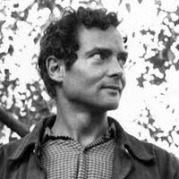 Most Americans have heard by now that W.S. Merwin is our new U.S. Poet Laureate; but given the relatively small readership poetry commands in this country, many may know little or nothing about his work and accomplishments. Merwin, 82 now, has written over 30 books of poetry, translation and prose and has won countless awards, including two Pulitzer Prizes, the National Book Award, the Bollingen Prize and the Ruth Lilly Poetry Prize. Now that I’ve said something about his awards and prolificacy, I thought I would post some of his poetry. Even if you’ve already read the below poems, they're worth revisiting. Great poems always warrant and reward rereading. Here’s a haunting poem of his that condemns the Vietnam War: The Asians Dying When the forests have been destroyed their darkness remains The ash the great walker follows the possessors Forever Nothing they will come to is real Nor for long Over the watercourses Like ducks in the time of the ducks The ghosts of the villages trail in the sky Making a new twilight Rain falls into the open eyes of the dead Again again with its pointless sound When the moon finds them they are the color of everything The nights disappear like bruises but nothing is healed The dead go away like bruises The blood vanishes into the poisoned farmlands Pain the horizon Remains Overhead the seasons rock They are paper bells Calling to nothing living The possessors move everywhere under Death their star Like columns of smoke they advance into the shadows Like thin flames with no light They with no past And fire their only future Over the centuries many poets have written about death—Dickinson, Keats, Milton, Thomas Gray and Yeats, to name a few. In the below poem, Merwin finds an ingenious way to talk about his own future death: For the Anniversary of My Death Every year without knowing it I have passed the day When the last fires will wave to me And the silence will set out Tireless traveler Like the beam of a lightless star Then I will no longer Find myself in life as in a strange garment Surprised at the earth And the love of one woman And the shamelessness of men As today writing after three days of rain Hearing the wren sing and the falling cease And bowing not knowing to what 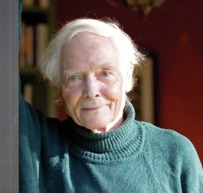 As for analyzing and summing up Merwin’s entire body of work, I won’t attempt to say much here. So much has already been written—and will continue to be written—on that subject. What I will say is that Merwin’s poetry, initially formal, soon evolved into an impersonal free verse that dispensed with punctuation. J.D. McClatchy adds, “Merwin’s early work absorbed the major traditions of English Romantic poetry; it is mythic or emblematic and richly rhetorical. By 1963, however, he had evolved a new style—austere, impersonal, disjunctive, often surrealistic.” While Merwin’s style has changed over the years, a major consistency in his work is the theme of humanity’s alienation from nature, an alienation he sees as catastrophic not only for the environment but for humanity itself. Links to Merwin’s poems and basic info on him:
Link to an archive of literary criticism on Merwin’s poetry:  I recently fell down the rabbit hole of some T.S. Eliot criticism. I’ve read and reread a lot of Eliot’s poetry over the years, but as amazing as he is, he’s one of the most difficult poets ever to write in English. So perusing good criticism of him is essential. The Eliot criticism I slogged through in the past wasn’t as helpful as the book I recently read. But the recent book, though insightful, was almost as difficult as Eliot’s poems. And what makes Eliot's poetry, and literary interpretation of his poetry, so difficult? His work’s mind-blowing preponderance of allusions, not just to literature but also to religion, mythology, anthropology, philosophy, history and science. Here I’m thinking of The Waste Land, arguably his masterpiece, as well as poems like The Hollow Men and Four Quartets. Eliot read everything and virtually all of it made its way into his poetry, usually in the form of allusions but sometimes in the form of quotations and partial rephrasings. (Incidentally, early in his career, the quotations, often without quotation marks, and partial rephrasings led to his being accused of plagiarism. Eliot — the über-modernist, writing in the early to mid 20th century — was sampling decades before hip-hop artists, the quintessential postmodernists, made sampling widespread within pop culture. But I digress...) To quote poet and Harvard professor Stephen Burt, before John Ashbery “the last figure whom half the English-language poets alive thought a great model, and the other half thought incomprehensible was probably T. S. Eliot.” Probably? No, definitely.  The book of Eliot criticism that I recently read, and found insightful but difficult, is B.C. Southam's A Guide to the Selected Poems of T.S. Eliot. Don't let the lightweight-sounding title fool you. The book is anything but lightweight. It's a compendium of the galaxies of criticism from preceding Eliot critics and goes through "all" the layers of allusions that undergird Eliot's work. If you want to grasp every single allusion Southam unearths, no matter how esoteric or complicated, and fully understand how and why Eliot is manipulating the texts he references, then reading Southam’s book is hard work, especially since you’ll need to flip back and forth between Southam’s book and Eliot’s poems, rereading the relevant passage from Eliot’s oeuvre each time Southam explains an allusion. As difficult as Southam’s book can be (and will be if used correctly), you should read it first and then move on to other books of Eliot criticism. Just my advice as someone who unfortunately reversed the order. The Eliot criticism I read before Southam’s book — Denis Donoghue's Words Alone will do as an example — wasn’t all that helpful, but that was only because I should have read Southam’s book first. Southam is a good (and incredibly thorough) starting place. Donoghue, after all, cites the book repeatedly. Some of you may be wondering, “Why even bother reading a poet as difficult as Eliot, especially since fully understanding him requires that you read scholarly books?” My answer? Eliot is worth the trouble. He’s one of the greatest English-language poets of the twentieth century and has had a deeper influence on my poetry than I care to admit. For me, gaining a greater understanding of his work is a tremendous boon. As Ezra Pound put it, “The more we know of Eliot, the better.” |
Dana's Blog
Thanks for stopping by. I'm glad you could make it. Categories
All
Archives
May 2016
Favorite BlogsProse Wizard |
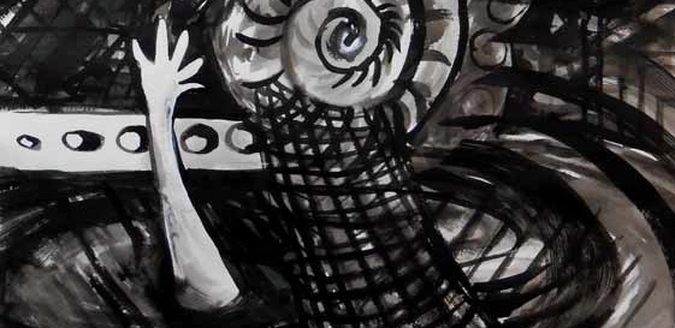
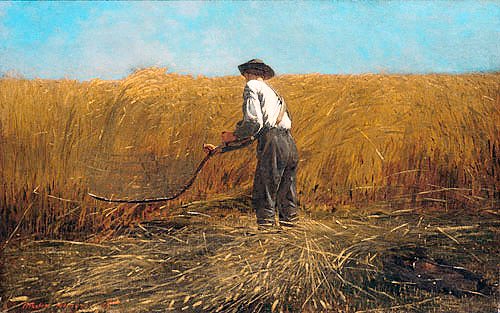
 RSS Feed
RSS Feed